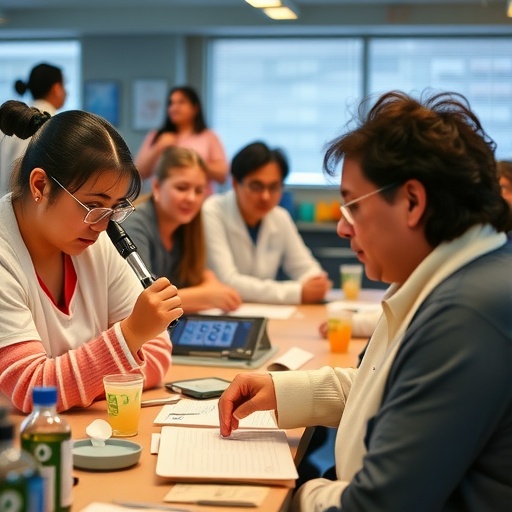In a groundbreaking study published in BMC Medical Education, researchers explored an innovative approach to teaching critical scientific competencies to undergraduate medical students in Switzerland. The week-long focused course was designed to equip students with essential skills for effective scholarly work, addressing a growing concern regarding the inherent gaps in traditional education that often overlook the demands of modern medical research. By integrating both theoretical knowledge and practical applications, this course aims to foster a new generation of competent, well-rounded medical professionals.
The research involved a pre-post study design, allowing participants to undergo assessment before and after their involvement in the program. Such a methodological framework not only measures immediate learning outcomes but also provides insights into how sustained these competencies are over time. The study’s significance lies in its timely intervention in medical education, where the need for adept researchers continues to increase in the face of evolving healthcare challenges.
Core competencies addressed during the course included critical thinking, data analysis, effective communication, and ethical considerations in research. The emphasis placed on these skills is particularly noteworthy as the landscape of medicine becomes increasingly data-driven, necessitating that future medical professionals not only understand clinical practices but also embrace the intricacies of scientific inquiry. The research underscores the importance of blending traditional medical education with robust research training to enhance the overall quality of healthcare delivery.
Participating students engaged in diverse learning methodologies, such as interactive lectures, hands-on workshops, and collaborative projects designed to stimulate critical engagement with scientific literature. The course material was meticulously crafted to challenge students’ preconceptions while encouraging them to explore complex medical topics deeply. These initiatives sought not only to impart knowledge but also to cultivate a mindset conducive to lifelong learning, a vital trait in the rapidly evolving field of medicine.
Evaluating the course’s impact revealed significant enhancements in participants’ ability to conduct scientific research and contribute meaningfully to academic discourse. Pre-course assessments established a baseline, while post-course evaluations depicted a marked improvement across various competencies. The findings highlighted the effectiveness of targeted educational interventions using practical engagement as a vehicle for learning enhancement.
Moreover, students reported increased confidence in their research abilities, citing improvements in skills such as formulating research questions, designing studies, and critically evaluating published literature. This newfound confidence is crucial; it encourages students to actively participate in academic settings and pursue research opportunities that might have otherwise intimidated them. The study results suggest that a well-structured educational intervention can diminish the barriers that deter students from venturing into scientific research.
The broader implications of such findings resonate beyond academic institutions. Medical professionals equipped with strong research skills contribute to evidence-based practice in healthcare settings, directly impacting patient outcomes. As the nature of medicine continues to evolve—particularly with the advent of big data and personalized healthcare—having skilled researchers at the helm becomes increasingly relevant. These professionals can effectively interpret complex data, leading to improved diagnoses, treatment plans, and ultimately, patient care.
Furthermore, the course underscores the importance of creating a supportive learning environment where students feel empowered to ask questions and challenge existing norms. Collaboration among students and faculty played a key role in enriching the educational experience, fostering an academic culture that values inquiry and encourages experimentation. This collaborative spirit is essential to cultivate as upcoming medical professionals navigate the complexities of clinical practice and research.
Feedback from course participants has overwhelmingly been positive, with many expressing a desire for similar programs to be extended and adapted throughout their medical education. The receptive attitude toward this learning model aligns with broader educational trends emphasizing competency-based education, marking a potential shift in how medical training is approached. The success of this initiative could very well inspire other institutions to reevaluate their curricula and implement similar focused courses aimed at bridging the gap between theory and practice.
In conclusion, the study’s findings offer a compelling argument for integrating dedicated research training into medical education. By focusing on core scholarly competencies, educators can play a transformative role in shaping future medical professionals who are not only proficient in clinical skills but are also capable of advancing medical knowledge through rigorous scientific inquiry. As education continues to adapt to meet the needs of modern healthcare challenges, initiatives like these represent a crucial step toward cultivating the next generation of medical researchers capable of driving innovation and enhancing patient care across the globe.
Subject of Research: Core competencies of scientific scholarship in medical education
Article Title: Imparting the core competencies of a scientific scholar through a week-long focused course: a pre-post study in Swiss undergraduate medical students
Article References:
Brauchli, P., von Eckardstein, A., Rogler, G. et al. Imparting the core competencies of a scientific scholar through a week-long focused course: a pre-post study in Swiss undergraduate medical students.
BMC Med Educ 25, 1398 (2025). https://doi.org/10.1186/s12909-025-07940-y
Image Credits: AI Generated
DOI: 10.1186/s12909-025-07940-y
Keywords: scientific competencies, medical education, research training, undergraduate medical students, Switzerland




